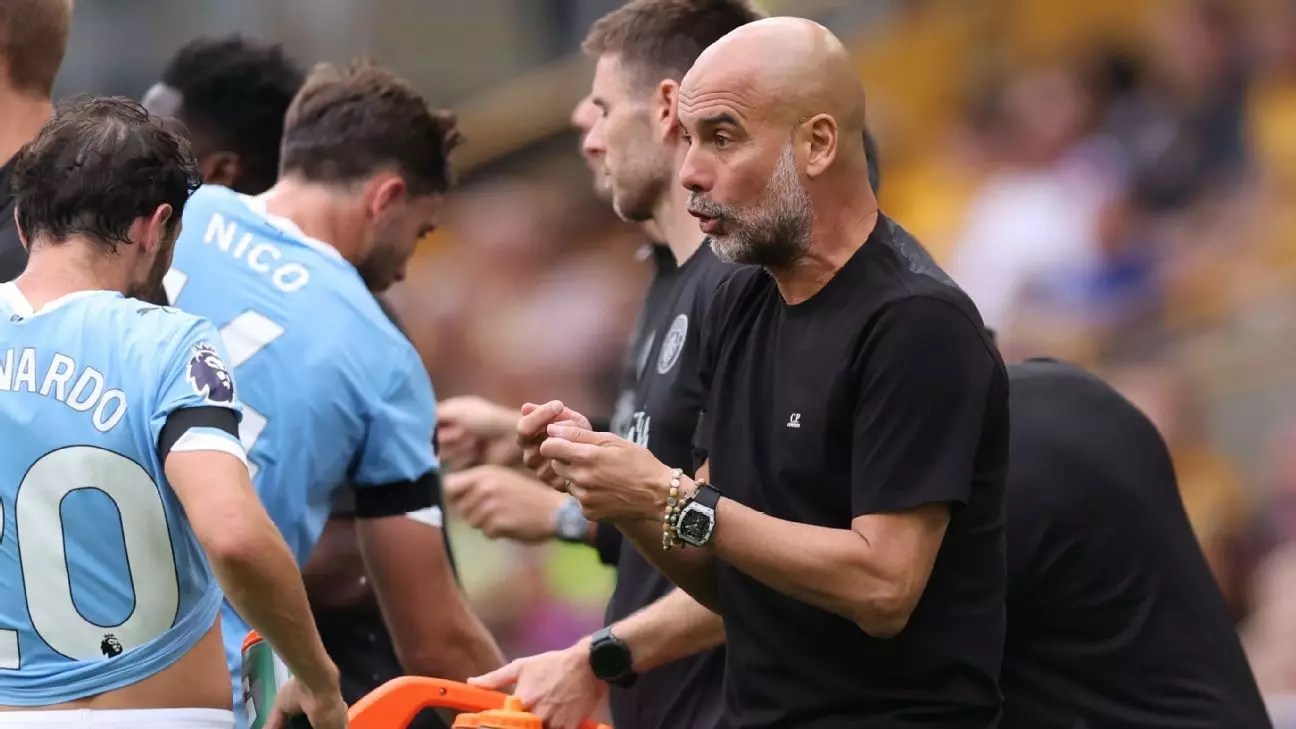Manchester City’s opening salvo of the Premier League season was nothing short of spectacular. A commanding 4-0 victory at Wolverhampton Wanderers showcased the team’s attacking prowess and tactical resilience. With Erling Haaland once again proving his worth by netting twice and new additions Tijjani Reijnders and Rayan Cherki making immediate impacts, the Citizens demonstrated their relentless pursuit of excellence. This dominant performance hints at City’s potential to secure yet another Premier League title, reinforcing their status as a top-tier football powerhouse.
However, beneath the surface of this promising start lies an undercurrent of instability that could threaten their sustained success. Pep Guardiola, the architect behind City’s recent dominance, publicly voiced concerns over the squad’s size. Despite the on-field triumph, Guardiola dismissed the notion that a bloated squad is beneficial, emphasizing that “it’s not healthy” to have too many players who don’t get regular minutes. His candid admission reveals a deeper internal dilemma: how to balance competitiveness with team harmony. While a large squad offers tactical flexibility and coverage across multiple competitions, it also risks creating discord and a diluted sense of purpose among players feeling sidelined.
The Challenge of Squad Optimization
Guardiola’s frank commentary underscores a strategic conundrum familiar to elite clubs: maintaining a squad large enough to contend on all fronts without diminishing overall morale. His desire to avoid “leaving players at home” points to an evolving philosophy—favoring a leaner, more cohesive unit that can foster a positive atmosphere. This determination to streamline indicates his recognition that excess manpower could lead to complacency, internal rivalry, or dissatisfaction, ultimately hampering performance.
The ongoing saga surrounding goalkeeper Ederson epitomizes this dilemma. Despite persistent rumors linking City with top-tier options like Gianluigi Donnarumma, Guardiola affirmed Ederson remains his “number one” choice—yet he also acknowledged that the Brazilian’s future hinges on negotiations and club decisions. Such uncertainty adds another layer to City’s squad planning, illustrating how even key figures are caught in a complex web of tactical priorities, player ambitions, and financial considerations.
Guardiola’s upcoming negotiations with players and agents aim to prune the squad, ensuring only those aligned with the team’s strategic vision remain. It’s a delicate balancing act: fostering competition and depth while preventing the kind of overcrowding that stifles progress and cohesion. For City, the next two weeks will be decisive in shaping their roster’s future, risking crucial stability if not managed astutely.
The Broader Implications for City’s Future
Leadership’s fight to balance squad depth with harmony reflects a broader truth about modern football: success hinges not just on talent, but also on meticulous squad management. Guardiola’s emphasis on maintaining a healthy environment suggests a shift towards more selective recruitment and a clear understanding that quality trumps quantity. His focus is now on creating a team that functions as a unified entity—one with shared goals, motivation, and clarity of purpose.
The case of the injured Ederson and the speculated interest from clubs like Galatasaray further exemplifies how external factors can influence internal decisions. It also highlights Guardiola’s stance that players must be happy and committed to the project. For City’s continued ascendance, it’s crucial that they cultivate a squad where each member feels valued, integral, and motivated—something that large, indiscriminately assembled rosters often struggle to sustain.
Meanwhile, the tactical aspect remains vital. City’s ability to exploit transitions, as demonstrated against Wolves, will be central to their success. Reijnders’ promising debut, contributing to two goals, signifies how new signings can energize the squad if managed properly. Pep’s vision includes not only tactical innovation but also a harmonious environment where players thrive without the burden of unnecessary competition.
The Road Ahead: Fixing the Internal Puzzle
City’s journey this season will test their managerial prowess in squad optimization. Guardiola’s honesty about the squad’s “unhealthy” size reveals a strategic priority to refine rather than expand, even in the wake of a winning start. The challenge lies in identifying which players to retain, which to transition out, and how to maintain competitive edge amidst internal shifts.
It remains to be seen how effectively City can navigate these internal waters without sacrificing morale or disrupting the unity that has positioned them among Europe’s elite. As they focus on trimming their roster, the most successful teams are those that foster an environment where every player feels indispensable, motivated, and aligned with their collective goals.
In essence, Manchester City’s current situation underscores that football success is as much about managing human elements as it is about tactical brilliance and talent accumulation. Guardiola’s candid critique of squad size is a reminder that even the most talented teams must pay close attention to the undercurrents influencing their harmony, morale, and long-term sustainability. The coming weeks will be critical in shaping how City balances ambition with internal stability—an internal puzzle that can either propel them to new heights or hinder their pursuit of sustained excellence.

